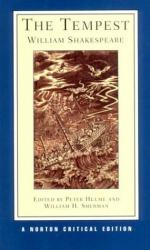|
This section contains 878 words (approx. 3 pages at 300 words per page) |

|
Colonialism in Shakespeare's "The Tempest"
Summary: Examines the theme of colonialism in Shakespeare's "The Tempest".
During Shakespeare's times many books existed which were a characteristic renaissance union between moral and political implications. These had the prime concern of convincing the public that exploration was honourable and sacred, that the civilised European traveller had to visit these distant islands to strengthen the savage men there. Even those who questioned of seizing the rights of native populations were half-propagandist about the fruitful nature of the new world.
Caliban is the central basis of the play. He is the symbol of the natural man, and is a measure against whom the civilised man is constantly compared. Much has been written about Caliban's lust for Miranda, since it is this which primarily inspires critics to call him as villainous or evil. We must also see Caliban's lack of self-control in this context. Most critics have deemed him to be a beast because they measure him by their...
|
This section contains 878 words (approx. 3 pages at 300 words per page) |

|


